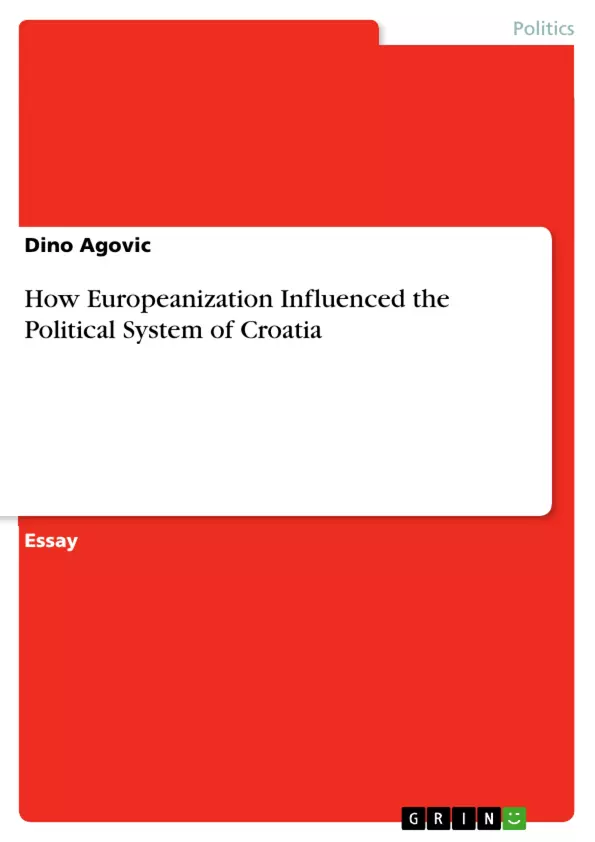Croatia declared independence from Yugoslavia in 1991 after a free election in 1990. Franjo Tudjman had won against communist opponents in the elections. Almost immediately, the army of the broken Yugoslavia attacked Croatia in a bid to take over the country again, a war lasted four years. Elections of 2000 saw the entry of President Stipe Mesic, who was substantially associated with the developments that later erupted in the nation of Croatia including regional cooperation and national healing strategies.
Inhaltsverzeichnis (Table of Contents)
- Chapter 1
- Croatian Historical Background
- General Political State after Independence
- Political State
- Institutions and Unions: European Union
- What took Croatia a long Time to Rise to the Occasion?
- Croatia joins Union Nations
- Problem definition / Research question
- Value of the Research
- Chapter 2
- Literature Review
- Examination of the requirements of integration and Croatian Institution have or have not adapted to the Changes Incentives for Joining; Advantages of being a member state
- Union Expectations of Member State
- Factor Consideration
- Impacts on institution after integration
Zielsetzung und Themenschwerpunkte (Objectives and Key Themes)
This report examines the impact of Europeanization on the political system of Croatia, specifically focusing on the country's path towards European Union membership and the subsequent changes within its political landscape. It seeks to understand the motivations behind Croatia's integration into the EU, analyze the challenges and opportunities presented by this process, and assess the long-term effects of Europeanization on Croatia's political structures and dynamics.
- The historical context of Croatia's political development leading up to independence.
- The motivations and incentives for Croatia to join the European Union, encompassing both economic and political factors.
- The impact of Europeanization on Croatia's political institutions, including the changes in governance, law enforcement, and foreign policy.
- The challenges faced by Croatia in adapting to the requirements of EU membership and the potential consequences for its political stability.
- The evolving nature of Croatia's political system in the wake of Europeanization, exploring both the positive and negative effects.
Zusammenfassung der Kapitel (Chapter Summaries)
- Chapter 1 provides an overview of Croatia's historical background, highlighting the country's journey from independence from Yugoslavia to its pursuit of European Union membership. It explores the political landscape of Croatia during this period, focusing on the challenges and opportunities presented by its complex past and the desire for integration into the European community.
- Chapter 2 delves into the literature on Europeanization and its impact on the political systems of accession countries. It examines the specific requirements and expectations of EU membership, analyzing the incentives for Croatia to join the Union and the benefits that it anticipates gaining from integration. The chapter also discusses the various factors that play a role in the process of Europeanization, including economic, political, and social considerations.
Schlüsselwörter (Keywords)
The primary keywords and focus topics of this text are Europeanization, Croatian politics, EU membership, political reform, institutional change, economic integration, and political stability.
Frequently Asked Questions
How did Croatia's history influence its path to the EU?
Croatia's declaration of independence from Yugoslavia in 1991 and the subsequent four-year war created a complex political landscape that delayed early integration efforts compared to other nations.
What is "Europeanization" in the context of Croatian politics?
Europeanization refers to the process where national political systems, institutions, and policies adapt to the standards and requirements set by the European Union.
Who was Franjo Tudjman and what was his political role?
Franjo Tudjman was the first president of independent Croatia, leading the country through its war of independence and establishing the initial political structures of the new state.
What were the main incentives for Croatia to join the European Union?
Key incentives included economic growth through access to the single market, political stability, regional cooperation, and the modernization of its legal and judicial systems.
What challenges did Croatia face during the EU accession process?
Major challenges included implementing extensive legal reforms, addressing issues of national healing after the war, and meeting strict EU criteria for governance and institutional transparency.
- Citar trabajo
- Dino Agovic (Autor), 2017, How Europeanization Influenced the Political System of Croatia, Múnich, GRIN Verlag, https://www.grin.com/document/364579



